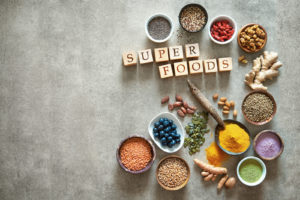
6 Vision-Enhancing Superfoods for Your Eyes
With the New Year comes many resolutions regarding health. Some people resolve to exercise more at the start of the year, leading to record gym attendance, while others vow to start a new diet or sleep more. If your list of resolutions includes benefitting your eye health (and it definitely should!), consider trying these six superfoods for your eyes. You’ll not only get the benefits of protecting your vision, but you’ll also be able to add some variety to your diet.
S uperfoods for Your Eyes
uperfoods for Your Eyes
Goji Berries
You may have heard of these berries before. They have often been advertised as a super fruit, and that’s definitely the case! These great-tasting red berries offer a cornucopia of vitamins, minerals, proteins, and amino acids that our bodies need. They have long been a part of the diet of people living in Tibet and Mongolia where they grow naturally.
It may be difficult to believe, but these luscious berries contain more vitamin C than an orange. As if that weren’t enough they also contain vitamins A, E, B1, B6, and B2. Plus, they have 21 trace minerals and 18 amino acids as well as protein. They are so nutrient-dense that you could almost live on a diet of Gogi berries alone! What truly makes these berries so beneficial for your vision, though, is the fact that they also contain five types of carotenoids that are vital to the health of your eyes.
While you may have trouble finding fresh goji berries, dried fruits are more readily available in the United States. And, with the increase in popularity of this super fruit, you may soon see fresh goji at your supermarket as well. For now, check your local health food store as well as any bulk food stores. Or, order them online from Amazon or other retailers.
Persimmons
Who knew that this native Chinese fruit could be so beneficial to your eye health? Persimmons contain lutein, lycopene, vitamin A, beta carotene, zeaxanthin, and cryptoxanthin, which we know are all very good for the eyes.
All these complicated-sounding nutrients have one thing in common: they are natural enemies of free radicals. Free radicals are derived from oxygen and contribute to aging and disease. They can have a major negative impact on our eyes. Antioxidants are the key to balancing the number of free radicals in our bodies.
Persimmons are another good source of vitamin C, which is very beneficial to eye health. Our bodies can’t store vitamin C, so it’s important to have good sources of this vitamin in our daily diet. If you’re allergic to citrus or just don’t like it, persimmons are a great natural alternative to up your vitamin C intake.
Studies have shown that vitamin C helps to reduce your risk of developing cataracts, delays macular degeneration, and aids in relieving eye pressure in glaucoma patients.
You can see why it is especially important to get your daily dose of vitamin C!
Kiwis
These fuzzy brown fruits don’t look all that appealing from the outside. While their visual appeal may be lacking, they are a must-have in your diet for good eye health. This small fuzzy fruit offers more nutrition per ounce than many of the fruits we commonly eat.
Along with the vitamin C that you probably expected, these small fruits are a rich source of copper. They also have plenty of manganese, potassium, vitamin A, vitamin E, and dietary fiber.
Don’t let the outside fool you; the best part of this fruit is found when you cut it open. This fruit can be added to almost any type of fruit salad or added to a tossed salad for some extra sweetness. But, the real star is the small black seeds inside.
These small black seeds contain oil that contains omega-3 fatty acids. Omega-3 helps to protect our bodies from free radicals caused by pollution and ultraviolet rays.
Chia Seeds
Yes, these really are the same seeds used for the Chia pets you’ve laughed at in television advertisements. However, their true benefit comes from eating these seeds as part of your breakfast smoothie or fruit bowl. These amazing seeds contain more potassium than a banana and more antioxidants than blueberries. Plus, they’re rich in the vitamins and minerals that are essential to good eye health. And, they’re a great source of omega-3 and omega-6 fatty acids. This is great news for people who don’t care for fish, as it’s an easy, neutrally flavored way to get these acids into your diet.
The easiest way to add these seeds to your daily diet would be to sprinkle them onto food that you’re already eating. Add some to your cereal or yogurt in the morning or sprinkle a few on your salad for lunch. Mixing them in with trail mix for an afternoon snack is also a good way to include them in your diet.
Raw Cacao
Cacao is one of the best sources of magnesium and iron. These are two minerals that many people have deficiencies in. The reason it made it on our list is the concentrated antioxidants it contains. Cacao has 21 times as many antioxidants as green tea, and 14 times more than red wine.
Antioxidants become more important as we age because they fight the oxidative stress levels in our bodies. Oxidants can cause eye problems like cataracts and macular degeneration as we get older.
A word of warning here: make sure that you get organic raw cacao. The cacao that you find in most stores has had the nutrients and antioxidants destroyed during processing, especially if it’s being made into a chocolate bar. You may want to look for this product at a natural food store or a health food store.
Kale
Kale is a leafy green vegetable that can be substituted for spinach in most recipes. It provides the vitamins, iron, and fiber that spinach does as well as being an easily absorbed source of calcium. This can be especially important for people who have difficulty absorbing calcium from other sources.
Kale has higher levels of vitamin K than broccoli, spinach, and Swiss chard. Vitamin K helps to promote proper blood clotting in the body.
It made our list of the best superfoods for your eyes because of the high amounts of zeaxanthin and lutein. These phytochemicals are essential for good eye health. These are found in relatively high concentrations in the retina of our eyes. They help to protect your eyes from cataracts and macular degeneration.
Hopefully, this list of superfoods for your eyes will help you add some diversity to your healthy diet. If you are looking to add a health-related resolution this year, adding these to your diet is a great place to start. Just because it’s good for you doesn’t mean that it can’t taste good, too!
Our Rebuild Your Vision Ocu-Plus Formula Contains All 17 Vitamins, Minerals, and Herbal Supplements to Improve Your Eye Health!












my body does not tolerate anything with high iron content due to hemachromatosis nor C-vitamin which affects the iron absorption. it seems sugar is the worst enemy to my vision…
Hi some of the fruits and food you mention i cannot get here in malta what do you suggest?
I HAD been eating kale, kiwis regularly; stopped recently and my visual acuity degraded